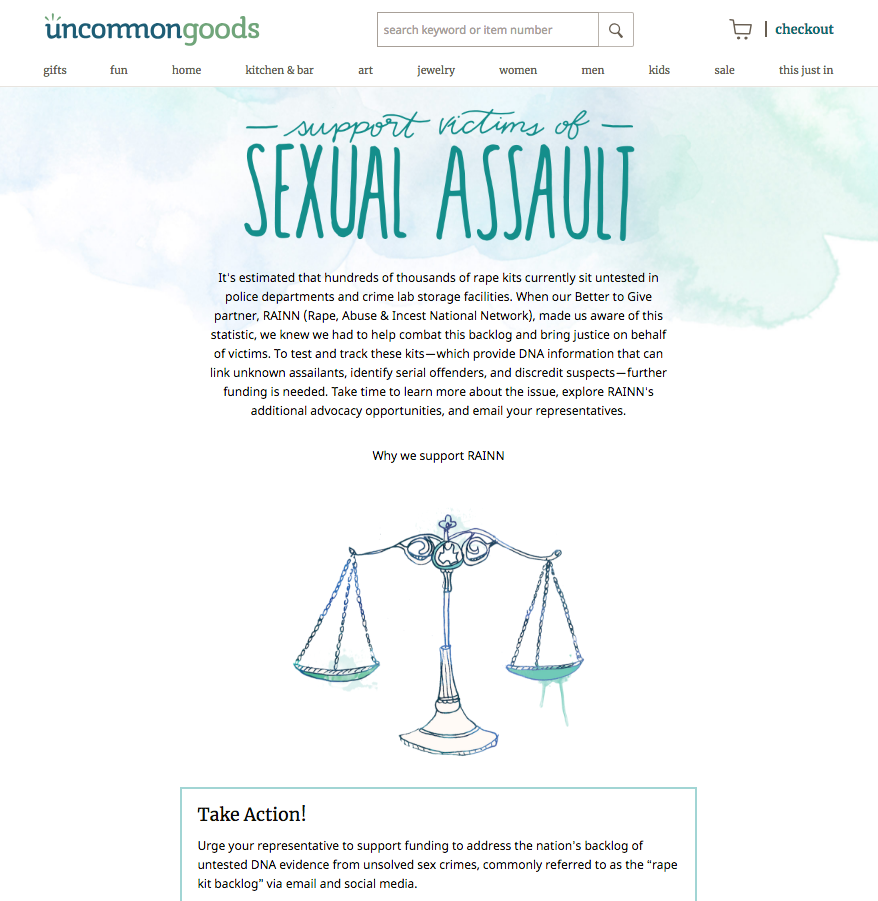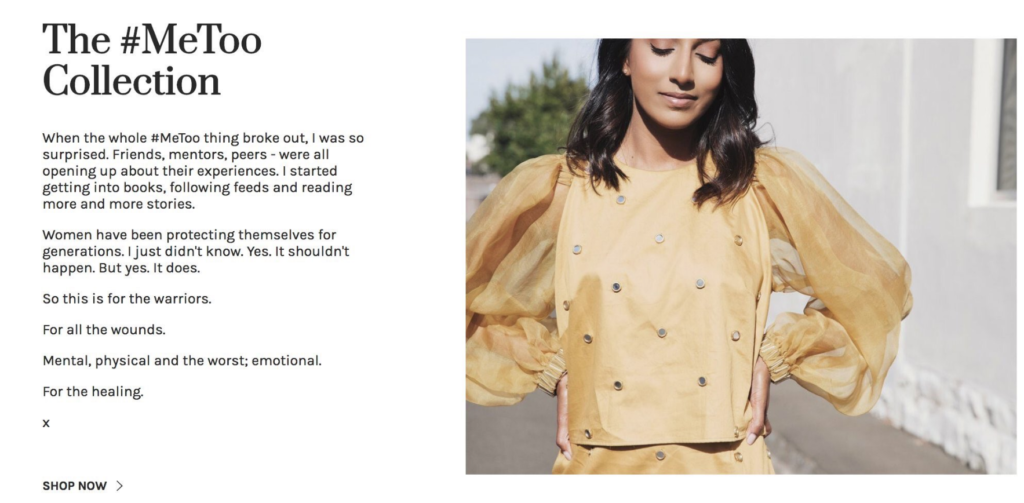In the midst of heated national discussions about sexual violence and gender inequality, brands that take a stance on these issues should be prepared to meet consumer scrutiny with principled action.
It all started with the October 2017 New York Times story detailing allegations of systemic sexual assault committed by movie mogul Harvey Weinstein. This revelation opened the floodgates to a barrage of allegations against powerful, famous men, fueling what would become the cultural atom bomb of the #MeToo movement. On its tails came Hollywood’s Time’s Up initiative to end workplace harassment and inequality.
In the still-simmering wake of these movements, corporate leaders and marketers alike are left wondering how to weigh in on this difficult subject, or whether they should take part in the conversation at all. Here are some of the best and worst marketing campaigns surrounding the #MeToo movement that have come to the forefront over the past year.
The Good: Twitter and Uncommon Goods
Social media giant Twitter launched their #HereWeAre campaign on the evening of the Academy Awards. The video’s melodic poetry and direct approach struck a chord with many viewers.
However, the ad initially received some backlash, with users accusing the platform of hypocrisy and claiming it does little to protect women from harassment on its site. In response, Twitter has made new pledges to battle online misconduct: just days before the ad aired, CEO Jack Dorsey acknowledged ongoing issues of misuse and harassment on the site, urging the public to help evaluate the health of interactions on the platform.
The brand is making concerted internal efforts to change, too. Danielle Citron, a University of Maryland law professor, has been a member of Twitter’s Trust and Safety Council for the last two years, and claims to have noticed “seismic change” in Twitter’s commitment to addressing harassment. What’s more, the company has proudly confirmed its commitment to equal pay for women and annual diversity goals focused on hiring more women and minorities. While there is certainly a long way to go, Twitter has made a significant effort to improve conditions for the platform’s female users and enacting corporate policy changes in favor of gender equality.
Meanwhile, ecommerce gift site Uncommon Goods set their sights on a more specific, but certainly just as noble cause: through their partnership with the Rape, Abuse, and Incest National Network (RAINN), the company is working to address the problem of rape kit backlogs, which can prevent victims of sexual assault from seeking justice. On its website, Uncommon Goods provides information about the cause, a form for subscribing to email updates from RAINN, and actionable insights on how to help survivors.

Both Twitter and Uncommon Goods serve as exemplary models for brands that wish to create informative, engaging content that serves a purpose beyond just weighing in on the newsworthy cause du jour.
The Bad: Kholo
Australian fashion brand Kholo answered the age-old question: is it acceptable to fully commercialize a movement centered upon individuals’ suffering? with a confident — and entirely tone-deaf — “yes.” Here’s how not to launch a marketing campaign in the heat of global uproar about sexual violence.

As an introduction to its creatively named “#MeToo” collection, Kholo flippantly referred to the movement as “the whole #MeToo thing” and featured products with names like “Sex on Legs” and “Take Me Off Slip Dress.” The launch was met with immediate backlash, prompting the brand to rename it “The Magnificent Women Collection.” Sorry, Kholo, but this may be your innuENDo.
The Ugly: Schweppes
Consumers care about authenticity in marketing, but brands aren’t stepping up to the plate. “Only 15% of companies are gender-fair according to research — but they pretend to be feminists in their marketing,” said Kristi Faulkner, President of Womenkind. “We’re creating a massive disservice to ourselves and the #MeToo movement by letting this go on.”
Take this campaign from Schweppes, which on the surface appears to be a valiant attempt at starting a conversation about harassment.
Unfortunately, Schweppes fails to reinforce this social experiment with meaningful action. The brand is owned by the Dr. Pepper Snapple Group (DPSG), whose board of directors includes just one woman. Meanwhile, the section of Schweppes’ website referencing the company’s commitment to diversity redirects users to a careers landing page populated with boilerplate legal language explaining that the company doesn’t discriminate based on factors like gender, sexual orientation, race, ethnicity, or religion when hiring — oh, duh, because they’re not legally allowed to.
The ad looks especially bad in light of a recent lawsuit filed by a female employee of a Dr. Pepper Snapple Group client, who alleges that she was sexually assaulted by a DPSG employee — and when she reported the incident to her manager, she was simply taken off the project. As long as these behaviors persist behind the scenes, ads like the one created by Schweppes are an empty promise for real change, capitalizing on social movements like #MeToo while failing to take direct action against sexual violence and gender inequality.
Evaluating When It’s Appropriate to Speak Up
Brands across the board have tried — and often failed — to participate meaningfully in conversations about sexual harassment and assault. To avoid joining the ranks of the misguided, evaluate your company’s culture, internal processes, and philanthropic goals for inconsistencies that could undermine your campaign’s message. Make every effort to ensure that the campaign is not an empty promise, but rather an affirmation of a real commitment to helping end sexual violence. By holding ourselves to a higher standard, marketers can help create a media landscape that is more tolerant, just, and equal for all.


